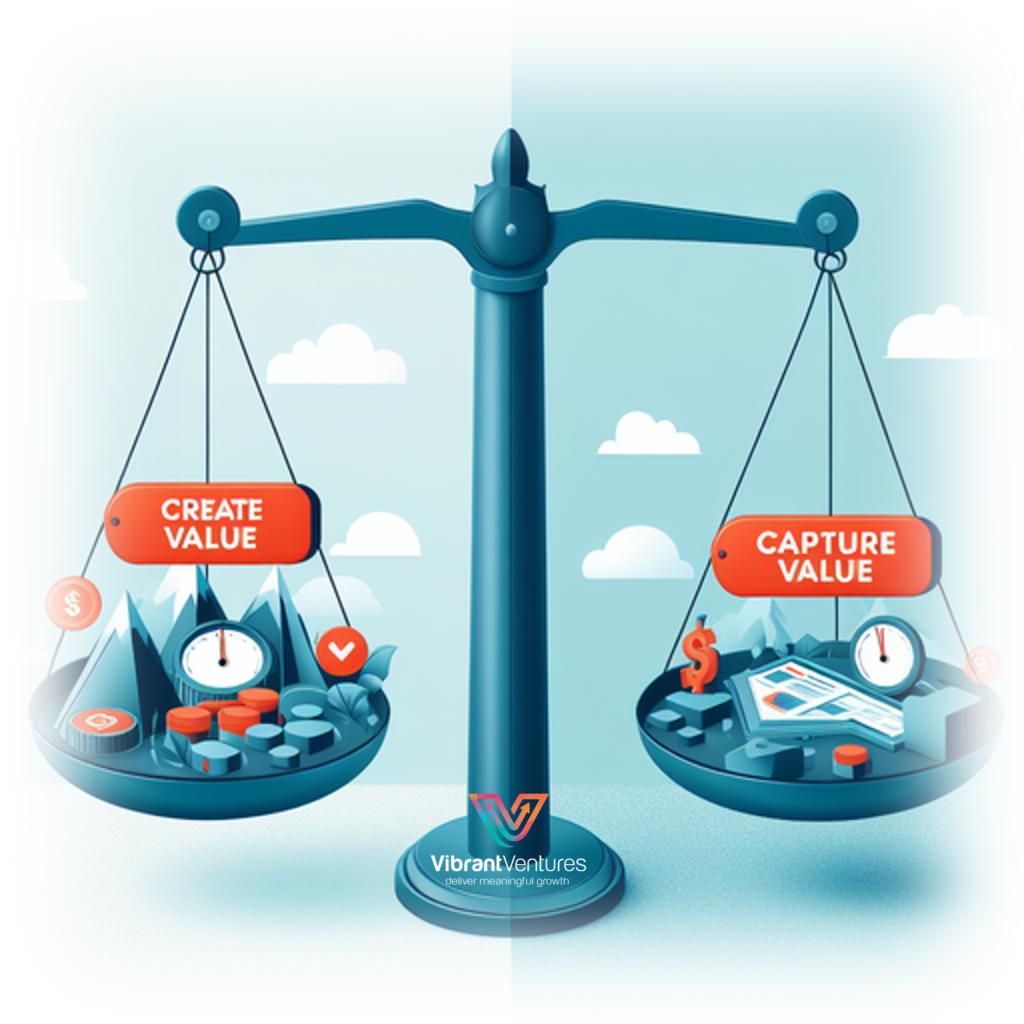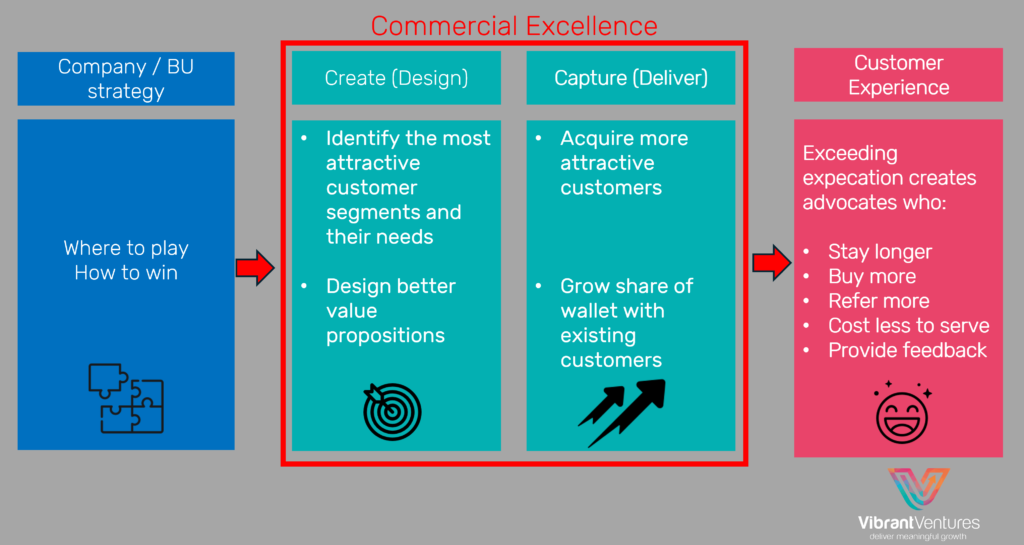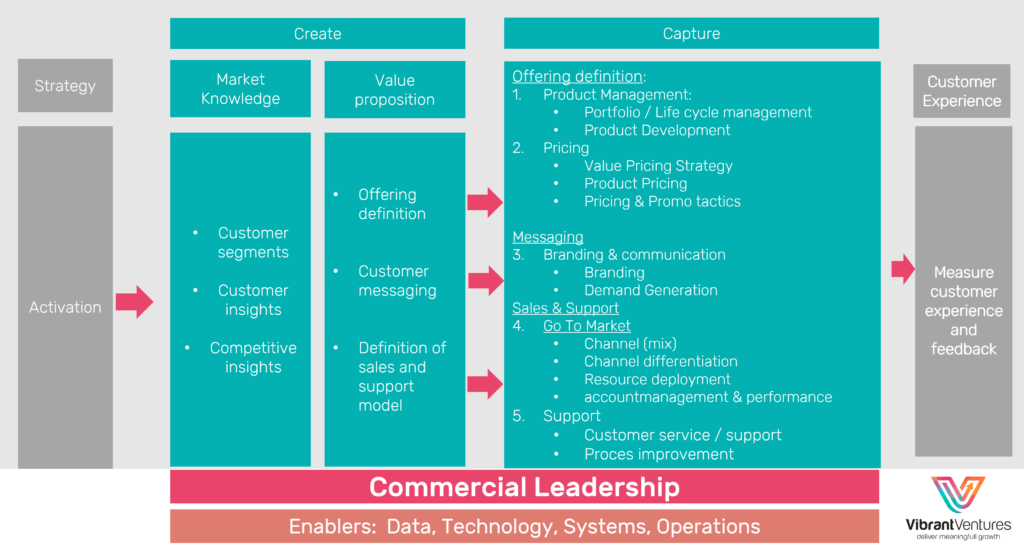To stay relevant in the future, business leaders need to work on at least 3 levels of value creation and meaningful growth. Meaningfull growth means:
- The traditional definition of growth measured in eg. revenue and margin
- Enlarge the positive impact on society and the environment (net positive)
- Grow the people capabilities & organisational health
The commercial domain, all that impacts customers, is playing a crucial role in this holistic value creation. This is the place where value for customers is designed and delivered.
However, in working with customers there is an increasing risk of value transfer in stead of creation. Customers are pushing your to handover your part of the pie (margin). The only way to escape from this value destruction trap is to increase the joint value or grow the pie (category). This is where commercial excellence and commercial leadership plays a crucial role.
In this article, I will define the essence of commercial excellence, explore the critical activities, multifunctional capabilities needed and the crucial role of developing commercial leadership. The content is based on +20 Years of commercial leadership experience and best practices shared by strategy consultants like McKinsey & Company , Boston Consulting Group (BCG) , Bain & Company , Kearney , L.E.K. Consulting . I’m applying the insights and models in my work as leader and consultant in all kinds of industries
Defining Commercial Excellence: A holistic approach to value creation
An organisation that is commercial excellent is able to create value for customers and is able to capture this value for all of the stakeholders. It’s like a scale with two sides that strives for balance. Value is created through the products and services being offered and recognised by your target customers. If you create too little value for customers, they will choose an alternative. If target customers don’t know or recognise the value you have created, your offering is not sustainable.

Commercial excellence is the activity system that is translating your company or business strategy (Where To Play / How To Win) into a customer experience in which expectations are exceeded. As a result customers will stay longer, buy more, refer more and cost less to serve and they will tell you how they feel.
The core of the commercial excellence activity system (also referred to as go-to-market strategy) is the design and delivery part. Based on market and customer insights the most attractive customer segments are chosen and value propositions based on clear pains and gains are developed. In the delivery part the focus is on acquiring more / new customers and by increasing the spending of existing customers.

Multifunctional Skills: A key ingredient for commercial excellence
Achieving commercial excellence requires a unique blend of skills and expertise and connect them. Organizations need individuals who possess not only deep functional knowledge but also a broad understanding of the commercial landscape and the ability to collaborate effectively across departments.

- Strategy and Business Acumen: The ability to analyze market trends, identify opportunities, and develop strategic initiatives to drive growth.
- Marketing and Sales Expertise: A deep understanding of customer needs, effective marketing strategies, and sales methodologies to drive conversions and revenue.
- Product Development and Pricing: Knowledge of product development processes, pricing strategies, and value proposition creation to ensure products are competitively priced and meet customer needs.
- Data-driven decision-making: Leveraging data analytics to gain insights into customer behavior, market trends, and campaign performance.
- A flexible and adaptive mindset: Embracing a willingness to experiment, learn from failures, and adapt strategies to changing market conditions.
- Technology integration: Effectively utilizing technology platforms and tools to streamline processes, enhance collaboration, and improve customer engagement.
The Critical Role of Commercial Leadership

Senior leaders plays a crucial role in fostering a culture that values, invests in, and empowers commercial talent. Effective commercial leadership involves:
- Ability to create trust. Trust is the dynamic outcome of a relationship between 2 people. It requires one to be vulnerable and open to listen. Listen to understand in stead of listening to reply.
- Understanding the business of tomorrow. Being knowledgeable about your customers business and the trends impacting their industry. Able to share the impact trends have on the future needs and solutions they will be looking for.
- Co-create joint value. Value creation is often an iterative process in which known and unknow value drivers are discovered, disclosed and solutions are designed to meet the value drivers.
- Empowering commercial teams to excel. Providing autonomy and resources to commercial teams, while fostering a culture of continuous improvement and innovation. Being available to clarify and set priorities.
Conclusion: A Path to Sustainable Growth
In conclusion, commercial excellence is not just a buzzword; it’s a crucial for organizations seeking to thrive in today’s world where holistic value creation is needed. By cultivating a culture of commercial excellence, organizations can unlock the potential for substantial growth and customer success. By building commercial leadership skills organizations can unleash the value that commercial excellence has to offer.
